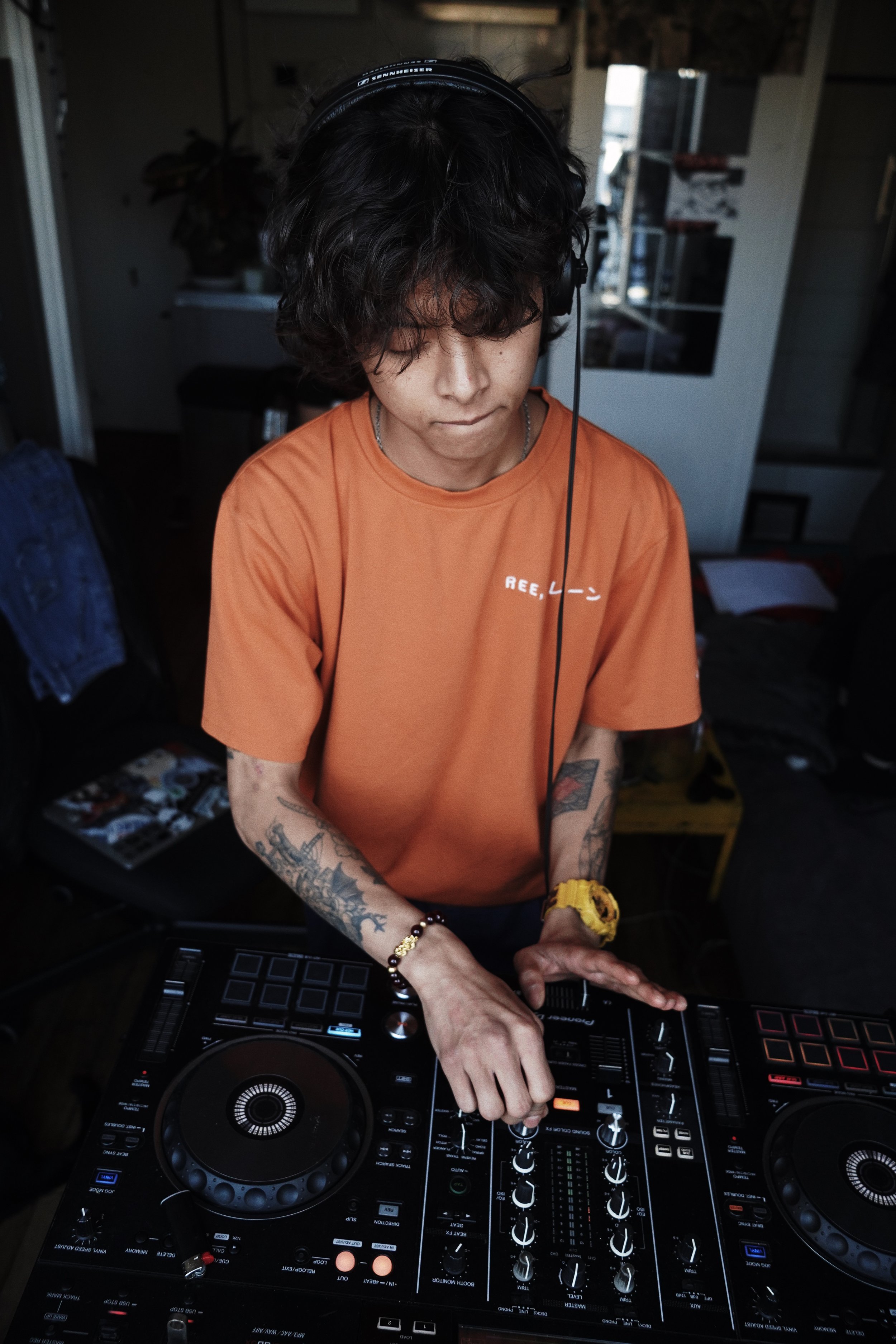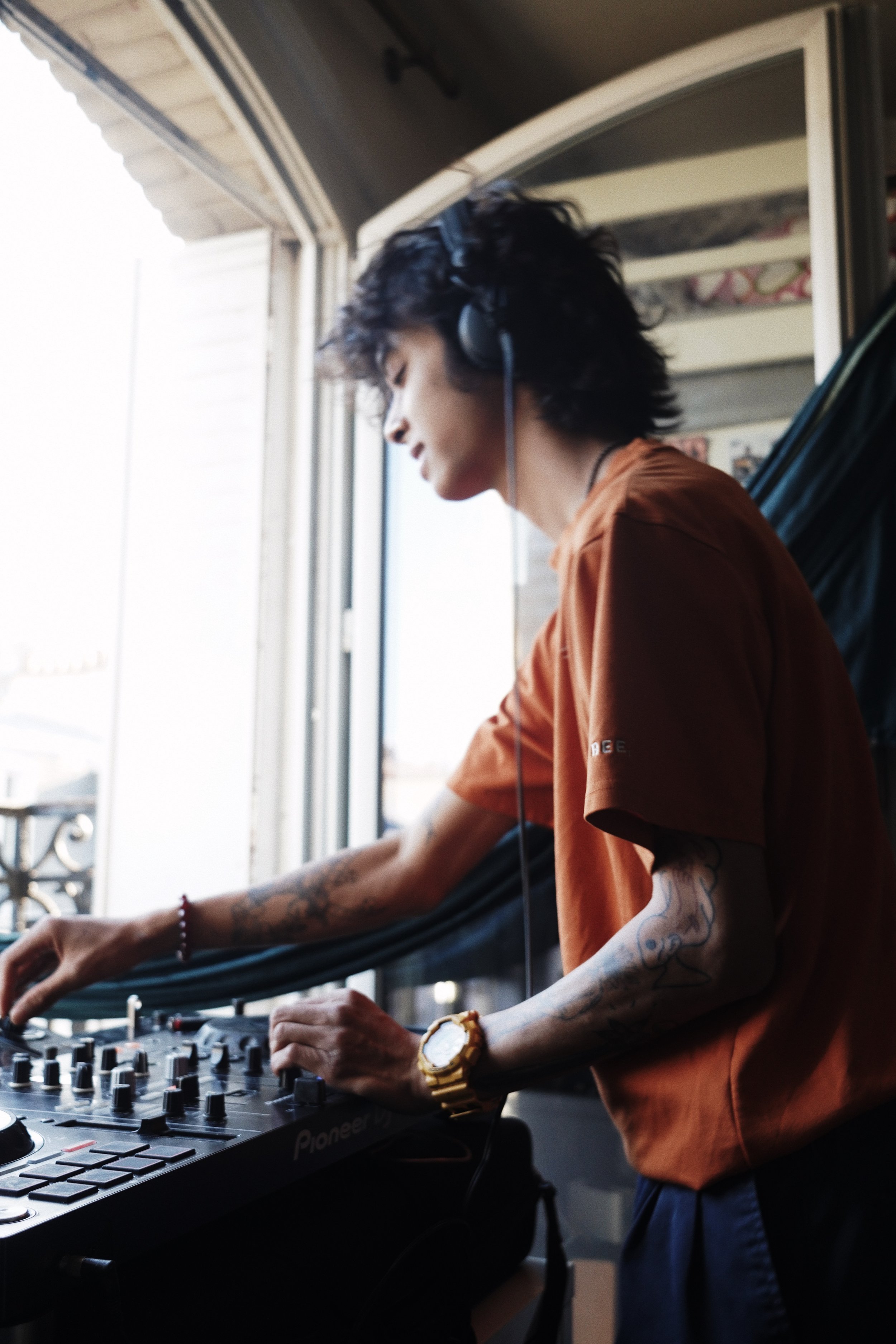Interview with Rin la Dalle
Interview and photos by Zara nneka
Would you introduce yourself to our readers?
My name is Ryan Nguyen, or Rin la Dalle. I’m 23 and was born and raised in Paris.
When did you first get into music? What’s your first/earliest memory related to music?
As a consumer, I first got into music when I was 12, certainly through Daft Punk or something like that. At 16, I got into DJ Snake and went to one of his shows at [venue] Le Zenith. I took drugs for the first time there, it was my first time for a lot of things at that show. After the show, I realized I wanted to do the same thing in my own way. I bought my first DJ equipment when I was 17, and that’s how it started.
Who are your main inspirations, when it comes to DJing? Which artists have influenced you/your music the most?
It depends on the year. In the beginning it was DJ Snake and Tchami - Tchami was the guy that really gave me the passion for DJing. After that I realized I really prefer techno music rather than EDM. And I came to the realization that it was possible to do my kind of music. My universe is really colorful and flowery, and I try to insert that into my music. It can be artsy and groovy and melodic, and all of these guys have really inspired my artistic direction.
Your latest single “Flower Flip” just came out. What was the process behind creating that? And your first release “Economy Class”?
For the first release, “Economy Class”, I wanted to share with people that I really love hard music. That doesn’t necessarily mean hard techno, but also dubstep and drum ‘n’ bass. I wanted to show people that I could make violent music with melodic undertones, and it can be groovy as well. “Flower Flip” was more of a pleasure to make. I wanted to create a piano synth with a lot of reverb, that also sounded a bit futuristic. Rhythmic, catchy, with acid influences, and it’s more house-y. Initially it was an instrumental for some friends to sing on, but it was not good as just an instrumental. So I turned it into a techno track, and that’s the “Flower Flip” you know. I made it in a week.
Did you have any doubts about releasing your own music?
Now no, but at the beginning yes. I started producing three years ago during the lockdown. But I still wasn’t sure about production and I didn’t have any real, professional skills. I just watched
YouTube tutorials and they weren’t that good. A year ago, I went to school for music production in Paris. They teach you how to use [the program] Ableton in the professional way, because the professors are professional musicians themselves. They taught me a lot, and you really have to practice everyday if you want to improve - it’s the same as any other art.
Paris is abundant with great music “scenes” - how do you navigate this? Which ones are you more involved in?
Obviously my favorite is the techno scene - but I do love rap music a lot. I’ve loved it since I was young and I still go to the events, in a more intimate setting. Some of my friends are rap artists and they’re my favorites. I get involved and I want to help them with their projects, helping them DJ or with sets. In the techno scene, I’m just trying to do my own thing with my friends.
What does a typical night out look like for you? Take us step by step - from the pre-game to the afters.
To be honest, I love taking naps. Waking up slowly, then going to a short pre-game. For me, a pre-game doesn’t have to start at 7 PM. Chill, take a nap, wake up at 10 or 11. I go to techno parties more often than rap or hip-hop parties. Most of the time, the rap parties finish between midnight and 2 AM. So it happens often that I do both in one night.
I do like afterparties now, but there was a long period of time where I didn’t. It was going to some random guy’s place, taking drugs again and again until the next day, trying to prolong that feeling and having no conversation. That was all useless to me. You can meet some great people, not all afterparties are like that. My mind has changed only because I’ve found a group of friends I have a really great time with after a night out. You have to be with the right people. It’s nice to meet new people and I like to, but it’s not my priority.
In addition to making music, you have a day gig as a pastry chef - both require creativity in their own way - but they’re still pretty different jobs. How do you maintain a good work/life balance?
By sacrificing my sleep [laughs]. No, but to be honest, it depends. When I started DJing, I was already a pastry chef and I had a CDI (work contract for an indeterminate amount of time). I would wake up every day at 4 or 5 AM. So I’d do a gig from 3 to 5 AM, then go straight to work. I did that a lot last year, and eventually of course I was so tired every day. It became a part of my personality to be tired all the time. This annoyed me a lot, so I decided to stop that job and begin a new one. I’m a freelancer now and I can choose when I want to work. My company is one that hires only freelancers. They’re cool, and they support my projects. When I
tell them, “I have a gig, I need to DJ this particular night”, they’re like, “You go, girl!” I’m not afraid of turning away a gig and being fired from the company. I told them the first day I met them, “If you want to keep me in your company, you need to give me the flexibility to do my own work as well”. I have freedom, but I also have security.
What are your favorite venues for music in Paris? Anything from bars to nightclubs.
As a DJ, I haven’t performed in a lot of the places I would like to yet. One of the best gigs I’ve had in a Paris club was at La Palmeraie. It’s really cool - it’s an old swimming center with huge rooms that they’ve turned into a nightclub. I’ve had two gigs there. They were huge - 2,000 people were there. The most recent one I did was at La Gare Le Gore. This gig was more intimate, and the people were crazy. We’re all a bit crazy.
Finally, do you have any advice for young people who are into music and enjoy it as consumers, but would like to take the leap into making their own music? What would you have to say to them?
Don’t lose faith, and do it every day. Those are the most important things you can do. If you don’t practice and you’re lazy, you’ll never improve.



